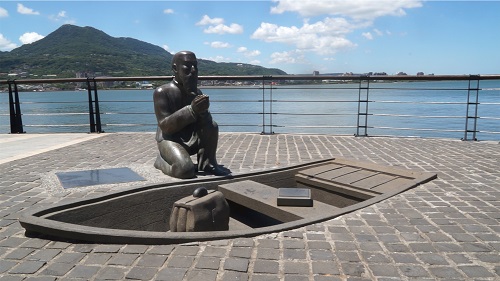國際醫療中心
醫療項目SERVICE
Congenital Disease
| Features | Advantages | Service Items |
The rare disease holistic medical care team of MacKay Memorial Hospital plays an important role in the early diagnosis and management of rare diseases. This team consists of geneticists, pediatric cardiologists, pediatric gastroenterologists, pediatric neurologists, neonatologists, pediatric endocrinologists, pediatric intensive care unit doctors, pediatric otorhinolaryngologists, pediatric surgeons, pediatric orthopedists, pediatric ophthalmologists, pediatric rehabilitationists, nurses, social workers and chaplain assistant of Pastoral Care Department. Nowadays, as a model in the field of rare disease care in Taiwan, we have treated lots of patients with rare diseases.
The rare disease holistic medical care team of MacKay Memorial Hospital has 12 major features as follows:
Feature 1: Integrate information on rare diseases in the world and lead the pulse of global development.
- In 2007, the team accepted the invitation of Dr. Sankar S, Dr. Michael A, and Dr. Maheep B, internationally renowned experts in genetic and metabolic diseases, to write the first chapter of the textbook Neurochemistry of Metabolic Diseases-Lysosomal storage diseases, phenylketonuria and Canavan disease.
- Textbook of Genetic Metabolism: Chuang CK, Lin SP: Neurochemical changes and therapeutical approaches in mucopolysaccharidoses. In Neurochemistry of Metabolic Diseases-Lysosomal storage diseases, phenylketonuria and Canavan disease. Edited by Sankar S, Michael A, Maheep B. Trivandrum, India: Transworld Research Network; 2007:1–20.
- In 2018, the team accepted the invitation of Dr. Shunji Tomatsu, Christine Lavery, Dr. Roberto Giugliani, Dr. Paul Harmatz, Dr. Grzegorz Wegrzyn, Dr. Maurizio Scarpa, and Dr. Tadao Orii to write the Chapter 32 of the Mucopolysaccharidoses Update, the textbook on polysaccharides
- Textbook of Mucopolysaccharidoses: Mucopolysaccharidoses Update (2 Volume Set). 2018. Editors: Shunji Tomatsu, MD, PhD, Christine Lavery, MBE, Roberto Giugliani, MD, PhD, Paul Harmatz, MD, Maurizio Scarpa, MD, PhD, Grzegorz Węgrzyn, PhD and Tadao Orii, MD. Chapter 32. Newborn Screening of Mucopolysaccharidoses: Comparison of the Fluorometric Technique and Tandem Mass Spectrometry for Enzyme Assay (Chih-Kuang Chuang, PhD, Hsuan-Chieh Liao, PhD, Hsiang-Yu Lin, MD , PhD, Chuan-Chi Chiang, PhD, and Shuan-Pei Lin, MD, Department of Medical Research, MacKay Memorial Hospital, Taipei, Taiwan).
Feature 2: Newborn screening program for MPS types I, II, IVA, and VI plays an important role as the world leader.
- Since 2008, the MacKay Memorial Hospital team has been devoted to research and has been fully implementing the pioneering project of neonatal screening for mucopolysaccharidosis type 1. With the simple screening method of filtering paper blood slides, it is possible to detect newborns immediately. Identify possible patients, and then achieve early detection, early treatment, and good curative effects. At the same time, genetic counseling is carried out to help families of sick children get rid of the fate of the recurrence of genetic diseases.
- SCI medical papers: Lin SP, Lin HY, Wang TJ, Chang CY, Lin CH, Huang SF, Tsai CC, Liu HL, Keutzer J, Chuang CK. A Pilot Newborn Screening Program for Mucopolysaccharidosis Type I in Taiwan. Orphanet J Rare Dis. 2013;8:147.
- Since September 2015, three newborn screening centers in Taiwan (Health Foundation, Pathology Center, and National Taiwan University Hospital) have started newborn screening programs for MPS types I, II, IVA, and VI. And MacKay Memorial Hospital serves as the medical center for referral and diagnosis of suspected positive or positive cases of MPS nationwide.
- SCI papers: Chuang CK, Lin HY*, (co-first author) Wang TJ, Huang YH, Chan MJ, Liao HC, Lo YT, Wang LY, Tu RY, Fang YY, Chen TL, Ho HC, Chiang CC, Lin SP. Status of newborn screening and follow-up investigations for Mucopolysaccharidoses I and II in Taiwan. Orphanet J Rare Dis. 2018;13:84. (SCI)
Feature 3: The number of research papers published ranks first in Asia.
Feature 4: Integrate teams from various departments to jointly publish cross-disciplinary, inter-academic, and international academic research.
- The rare disease holistic medical care team of MacKay Memorial Hospital has been devoted to the research of rare diseases for more than 30 years. Since 1993, more than 250 academic papers on rare diseases have been published in international medical journals.
- The content of the paper includes the incidence, natural history, clinical manifestations, gene mutation characteristics, cardiac function, bone mineral density, sleep examination, pulmonary function test, hearing test, percutaneous endoscopic gastrostomy, and anesthesia experience of rare disease patients in Taiwan. , imaging analysis, special biochemical tests, laboratory diagnosis, global expert consensus meetings, prenatal diagnosis, clinical trials of new drugs, newborn screening, and treatment outcomes, of which more than half of academic research papers are cross-disciplinary, cross-hospital, and Cross-international, amazing results of team cooperation with European, American and Asian countries.
Feature 5: The establishment of the Asia-Pacific MPS Network (APMN).
- In 2013, Dr. Shuan-Pei Lin served as the founder and core member of the Asia Pacific MPS Network (APMN).
Feature 6: Cross-international medical treatment and research, synchronizing with the world's top medical teams.
- Dr. Shuan-Pei Lin participated in the MPS I Consensus Meeting in Amsterdam, the Netherlands in May 2008, and worked with scholars and experts from Europe, America, and Australia to develop an international diagnostic consensus for MPS I.
- SCI papers: de Ru MH, Teunissen QG, van der Lee JH, Beck M, Bodamer OA, Clarke LA, Hollak CE, Lin SP, Rojas MV, Pastores GM, Raiman JA, Scarpa M, Treacy EP, Tylki-Szymanska A, Wraith JE, Zeman J, Wijburg FA. Capturing phenotypic heterogeneity in MPS I: results of an international consensus procedure. Orphanet J Rare Dis. 2012;7:22.
- In January 2010, Dr. Shuan-Pei Lin was invited to serve on The committee of Board Directors for the Asian Society for Inherited Metabolic Diseases (ASIMD).
- Dr. Shuan-Pei Lin and Dr. Hsiang-Yu Lin were invited to serve as reviewers for important international medical journals. Including Circulation, Orphanet Journal of Rare Diseases, Journal of Inherited Metabolic Disease, Molecular Genetics and Metabolism, and American Journal of Medical Genetics Part A.
- In 2002, Dr. Shuan-Pei Lin introduced Aldurazyme as a compassionate use to carry out enzyme replacement therapy for the first case of MPS I in Taiwan.
- SCI papers: Lin HY, Lin SP*, Chuang CK, Chen MR, Chen BF, Wraith JE. Mucopolysaccharidosis I under enzyme replacement therapy with laronidase--a mortality case with the autopsy report. J Inherit Metab Dis. 2005;28: 1146-8.
- In 2003, Dr. Shuan-Pei Lin accompanied the children with MPS VI to the Royal Manchester Children's Hospital for evaluation twice, striving for the opportunity to participate in the international human drug trial program, and finally succeeded. Later, Naglazyme, a treatment drug for MPS VI, was introduced into Taiwan, and was successfully covered by National Health Insurance, benefiting the only 10 MPS VI patients in Taiwan,
- SCI papers: Lin HY, Chen MR, Chuang CK, Chen CP, Lin DS, Chien YH, Ke YY, Tsai FJ, Pan HP, Lin SJ, Hwu WL, Niu DM, Lee NC, Lin SP*. Enzyme replacement therapy for mucopolysaccharidosis VI-experience in Taiwan. J Inherit Metab Dis. 2010;33(Suppl 3):S421-S427.
- In 2007, Dr. Shuan-Pei Lin was appointed by the Taiwan Human Genetics Society to conduct the Hunter Outcome Survey (HOS), and was invited to be the Asia-Pacific representative of the global HOS program.
- SCI medical papers: Jones SA, Almássy Z, Beck M, Burt K, Clarke JT, Giugliani R, Hendriksz C, Kroepfl T, Lavery L, Lin SP, Malm G, Ramaswami U, Tincheva R, Wraith JE; HOS Investigators. Mortality and cause of death in mucopolysaccharidosis type II-a historical review based on data from the Hunter Outcome Survey (HOS). J Inherit Metab Dis. 2009;32:534-43.
- In 2009, Dr. Shuan-Pei Lin successfully strived for MacKay Memorial Hospital to become the only clinical trial center of the International Natural History Research Project of MPS IV (MOR-001, which is a precursor to the Human Drug Testing Project) in Asia.
- SCI papers: Harmatz P, Mengel KE, Giugliani R, Valayannopoulos V, Lin SP, Parini R, Guffon N, Burton BK, Hendriksz CJ, Mitchell J, Martins A, Jones S, Guelbert N, Vellodi A, Hollak C, Slasor P, Decker C. The Morquio A Clinical Assessment Program: baseline results illustrating progressive, multisystemic clinical impairments in Morquio A subjects. Mol Genet Metab. 2013;109:54-61.
- In 2010, MacKay Memorial Hospital was selected as the execution center of Phase III (MOR-004, MOR-005) human trial program of the research drug for MPS IVA in Asia cooperating with Oakland Children's Hospital in California, USA. Phase II Human Trial Project of Special Drugs for Sick Children Under Five Years of Age (MOR-007).
- SCI papers: Hendriksz CJ, Burton B, Fleming TR, Harmatz P, Hughes D, Jones SA, Lin SP, Mengel E, Scarpa M, Valayannopoulos V, Giugliani R; STRIVE, Investigators, Slasor P, Lounsbury D, Dummer W. Efficacy and safety of enzyme replacement therapy with BMN 110 (elosulfase alfa) for Morquio A syndrome (mucopolysaccharidosis IVA): a phase 3 randomized placebo-controlled study. J Inherit Metab Dis. 2014 May
Feature 7: Provide international medical services for rare diseases.
- The rare disease patients who come to our hospital for consultation or consultation come from all corners of Asia. Including Japan, Korea, Hong Kong, Mainland China, Vietnam, Philippines, Malaysia, and Indonesia.
Feature 8: Become the national diagnostic center for mucopolysaccharidosis.
- Since 1999, our hospital has provided medical examination and diagnosis services for suspected mucopolysaccharidosis patients in medical institutions across the country. From 2007 to 2022, more than 1,500 urine or blood samples were collected.
Feature 9: Closely cooperated with rare disease patient support groups to improve the overall quality of medical care.
- To unite all rare disease families in Taiwan and become a big family in the same boat, keep in touch frequently, support and encourage each other, and work hard for the children’s special needs such as medical care, education, and well-being, with the assistance of Dr. Shuan-Pei Lin, " The Taiwan MPS Society was established on May 3, 1997, at MacKay Memorial Hospital, which is an important milestone in the care of patients with mucopolysaccharides in Taiwan.
- Dr. Shuan-Pei Lin and Dr. Hsiang-Yu Lin actively participated in the activities organized by the International Association of Mucopolysaccharides on behalf of Taiwan.
Feature 10: Dr. Shuan-Pei Lin and Dr. Hsiang-Yu Lin were invited to give speeches at various medical seminars in Taiwan and other countries to introduce rare diseases
Feature 11: Establish the most complete rare disease screening and diagnosis mechanism, and provide the first quality of service in Taiwan.
- SCI papers: Lin SP, Chang JH, Lee-Chen GJ, Lin DS, Lin HY, Chuang CK. Detection of Hunter syndrome (mucopolysaccharidosis type II) in Taiwanese: biochemical and linkage studies of the iduronate-2-sulfatase gene defects in Rare Diseases II patients and carriers. Clin Chim Acta. 2006;369:29-34.
- SCI papers: Chuang CK, Lin SP, Lin SJ, Wang TJ. Rare disease screening methods, the Berry spot, and acid turbidity tests cause a high incidence of false-negative results in Sanfilippo and Morquio syndromes. J Clin Lab Anal. 2002;16:253-8.
- SCI paper: Chuang CK, Lin SP*, Chung SF. Diagnostic screening for mucopolysaccharidoses by the dimethylmethylene blue method and two-dimensional electrophoresis. Zhonghua Yi Xue Za Zhi (Taipei). 2001;64:15-22.
Feature 12: Provide the most complete rare disease prenatal diagnosis and genetic counseling services, ranking first in Taiwan.
- Since 1998, our hospital provided prenatal genetic counseling services for families with rare diseases, strengthened the special biochemical and genetic diagnosis of rare diseases, and helped families with sick children to get rid of the fate of recurrence of genetic diseases.
SCI papers: Chen CP, Lin SP, Tzen CY, Hwu WL, Chern SR, Chuang CK, Chiang SS, Wang W. Prenatal diagnosis and genetic counseling of mucopolysaccharidosis type II (Hunter syndrome). Genet Couns. 2007;18: 49-56.
To effectively implement the purpose of "rare disease genetic counseling, clinical and research integration services", the Rare Disease Center cooperates with the Pediatric Genetics Department, the Medical Research Department, and the Laboratory Department to assist in the completion of the treatment of patients with various rare diseases. Family survey (Pedigree Analysis), providing disease genetic counseling for patients and their families, interdisciplinary consultation services, establishing and implementing domestic and foreign rare disease patient registration systems, and assisting in the implementation of rare disease new drug clinical trials, as follows:
- Pedigree Analysis of Rare Disease Patients: For suspected positive cases in the newborn screening center and patients with suspected rare diseases found in outpatient clinics, the genetic counseling room is set up and professional genetic counselors conduct a detailed Complete family analysis survey (Pedigree Analysis), providing genetic counseling for patients and family members of the disease: including medical clarification of the possible course of the disease after diagnosis and possible treatment; the inheritance pattern of the disease. It can help patients with rare diseases and their families through the painful and tormenting disease process. In addition, after the patient is diagnosed, the patient is arranged to receive appropriate medical treatment, track the treatment effect and monitor whether there is any adverse drug reaction. Owing to hard work over 30 years, our hospital has over 150 types of rare diseases announced by the government so far, and the number of patients has over 1,000. These are all valuable and important assets of our hospital in clinical services and research.
- Establish a comprehensive interdisciplinary integrated care model to improve the quality of medical services for genetic diseases: The symptoms of patients with rare diseases mostly affect various organs of the body. Many patients have undergone continuous referrals and treatments, but they have not been able to find the cause and effectively treat them. Patients have a bumpy road to seek medical treatment. They have undergone long examinations in various hospitals and departments. However, it is often difficult to diagnose or even misdiagnosed because the symptoms are similar to other diseases. Therefore, the center expects to establish a comprehensive cross-departmental integrated care model. Genetic counselors will assist patients to obtain a complete and rapid disease diagnosis, consultation and evaluation of various specialists, and detailed health education instructions so that patients can fully understand the disease. Rare diseases, and then after long-term use of therapeutic drugs, symptoms can be controlled and improved, and with the rare disease drug safety notification system, the side effects found by patients using drugs are recorded to ensure the safety of patients’ medication. It is hoped that after the establishment of the center, the integration of Various medical resources provides more convenient and better services for patients with rare diseases.
Implementation of the rare disease new drug clinical trial plan, the rare disease patient registration sub-project, and the database of the natural history registration system: Since Professor Shuan-Pei Lin is an internationally renowned medical expert on mucopolysaccharide disease, and the research potential of our hospital in rare diseases has attracted the attention and attention of the international medical community, Professor Shuan-Pei Lin has also undertaken several international collaborative research projects. Participation in the clinical trials and treatment of new drugs with rigorous design and a prudent evaluation and supervision mechanism can not only benefit the rare disease patients to obtain treatment opportunities with international academic standards in advance, and obtain the opportunity to promote their health, but also cooperate with the international pharmaceutical industry to enhance academic research capacity and greatly enhance the international visibility of our hospital and to step into the international arena.
Our Teams
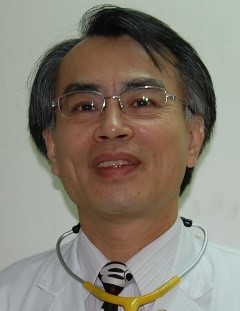
Dr. Shuan-Pei Lin: Senior Attending Physician of the Division of Genetics and Metabolism and the Department of Rare Disease Center.
Specialty: General Pediatrics; Inborn Errors of Metabolism; Genetic Counseling; Rare Diseases.
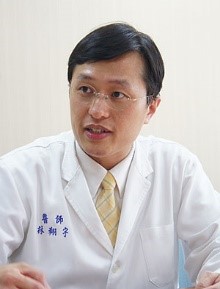
Dr. Hsiang-Yu Lin: Director of the Division of Genetics and Metabolism, Director of the Department of Rare Disease Center.
Specialty: General Pediatrics; Inborn Errors of Metabolism; Genetic Counseling; Rare Diseases; Pediatric Emergencies; Medical Research Paper Writing; Epigenetic Diseases.
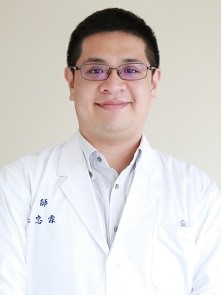
Dr. Chung-Lin Lee: Attending Physician at the Division of Genetics and Metabolism and the Department of Rare Disease Center.
Specialty: General Pediatrics; Inborn Errors of Metabolism; Genetic Counseling; Rare Diseases; Pediatric Emergencies
Honors
- The Department of Pediatric Genetics has published 254 SCI papers (1993/1/1-present). The title of the latest paper is “Updated Confirmatory Diagnosis for Mucopolysaccharidoses in Taiwanese Infants and the Application of Gene Variants”.
- Two of the SCI papers from our medical team were cited in the latest edition of the Nelson Textbook of Pediatrics (2020). The titles are as follows:
- Mucopolysaccharidosis III in Taiwan: Natural history, clinical and molecular characteristics of 28 patients diagnosed during 21 years
- Clinical characteristics and survival of trisomy 18 in a medical center in Taipei, 1988-2004
- The holistic health care medical team for rare diseases won the "2018 National Biotechnology and Medical Quality Award - Silver Award".
- MacKay Children’s Hospital won the"108 Contribution Award for Rare Disease Prevention and Control" by the National Health Service of the Ministry of Health and Welfare
- Dr. Shuan-Pei Lin won the 2019 Medical Contribution Award.
- The "Mucopolysaccharidosis Medical Care Manual" compiled by our team won "The 4th Good Book Award (2019)" by Taipei Medical Association in Taiwan.
Successful Case
- The rare disease mucopolysaccharidosis patients who came to our hospital for outpatient or consultation from Japan, Korea, Hong Kong, China, Vietnam, Malaysia, and Indonesia. The number of patients is shown below:
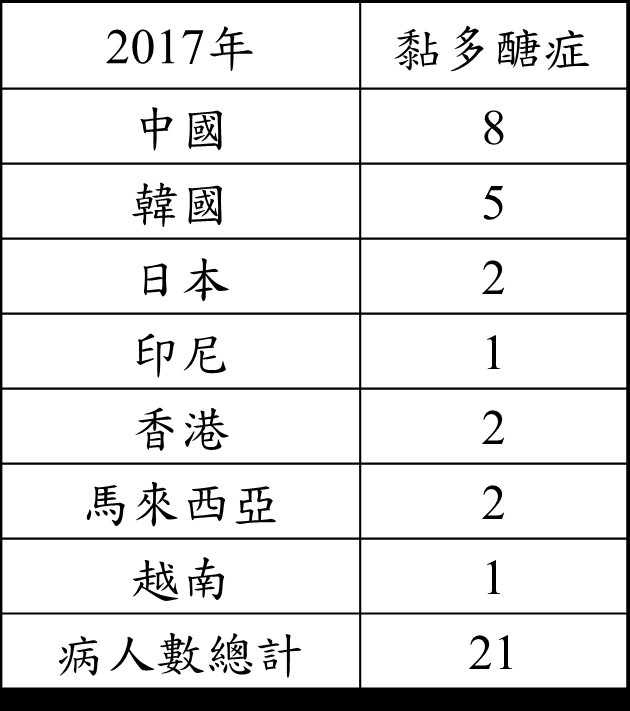
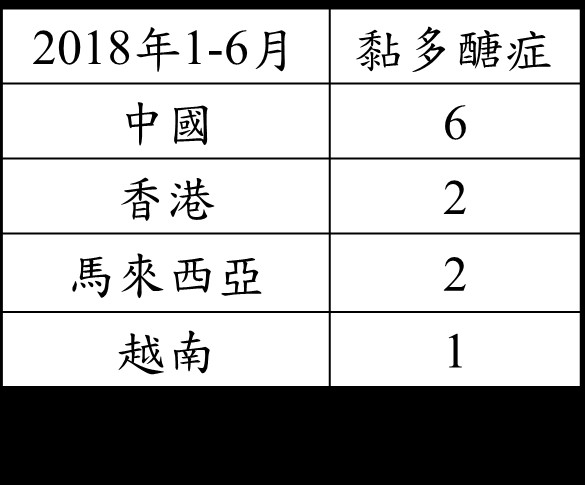
- In 2016, we became the only medical center in Asia that provide treatment under the International Mucopolysaccharidosis Type IIIB Human Trial and Research Program. There are still three international transnational human trial programs (MPS IVA & II) under implementation.
- To conduct the Rare Disease Care Service Plan of the Ministry of Health and Welfare (2020-2022): We served about 430 cases and 81 rare diseases in 2022.
.jpg)
.jpg)
.jpg)
.jpg)
.jpg)
.jpg)
.jpg)
.jpg)
.jpg)
.jpg)


